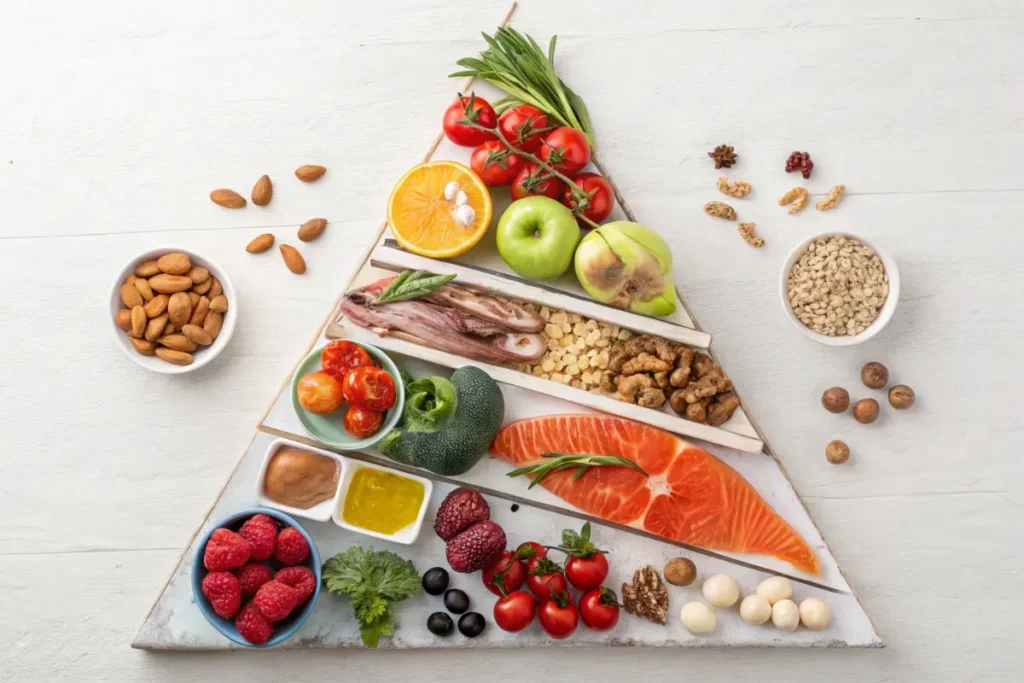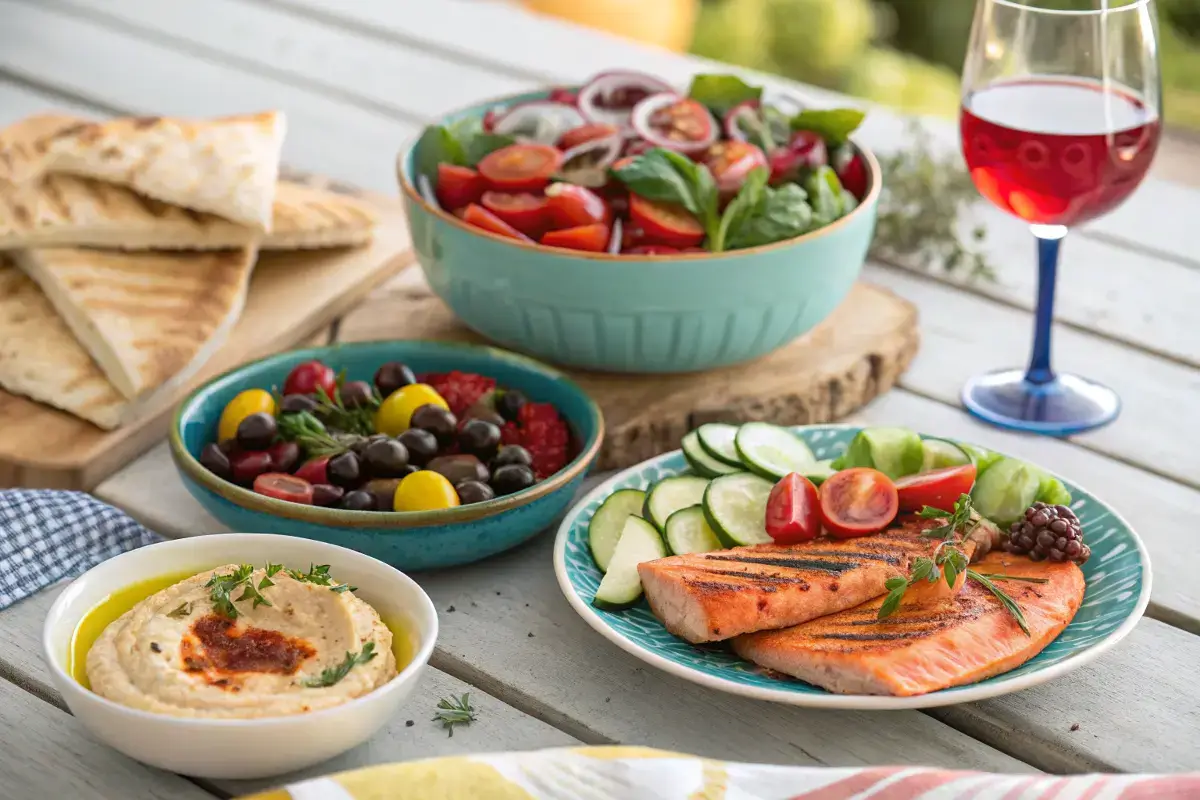The Mediterranean diet meal plan has taken the health and wellness world by storm—and for good reason. Rooted in the traditional eating habits of countries like Greece, Italy, and Spain, this diet is more than just a way to shed pounds. It’s a holistic approach to eating that prioritizes fresh, whole foods, while promoting long-term health benefits.
In this guide, we’ll dive deep into what the Mediterranean diet is all about, explore its numerous health benefits, and provide you with a carefully crafted 7-day Mediterranean diet meal plan. You’ll learn about its core foods, practical tips for shopping, and ways to prep meals ahead of time. By the end, you’ll be ready to embrace this lifestyle with confidence and ease.
What is the Mediterranean Diet?
Origins and Philosophy
The Mediterranean diet is more than just a set of food rules—it’s a celebration of life, family, and culture. Emerging from the coastal regions of the Mediterranean Sea, this diet mirrors the eating habits of communities that prioritize fresh, seasonal produce and home-cooked meals. Meals are enjoyed leisurely, often shared with family or friends, reflecting the region’s relaxed and communal lifestyle.
Core Principles of the Mediterranean Diet
Unlike restrictive diets, the Mediterranean diet focuses on inclusion rather than exclusion. It emphasizes:
- Plant-based eating: Fresh vegetables, fruits, legumes, nuts, and whole grains form the backbone of the diet.
- Healthy fats: Olive oil, the liquid gold of the Mediterranean, is a staple, while fats from fish and nuts also play a key role.
- Moderate protein: Fish, poultry, and eggs are common, with red meat consumed sparingly.
- Minimal processed foods: Say goodbye to heavily processed snacks and sugary drinks.
This balance not only supports overall health but also makes the diet sustainable in the long run.
Why the Mediterranean Diet Works
So, what makes the Mediterranean diet meal plan so effective? It’s all about combining nutrient-dense foods with lifestyle habits. The diet’s high fiber content keeps you full longer, reducing the temptation to overeat. Plus, the inclusion of healthy fats and proteins stabilizes blood sugar, providing steady energy throughout the day.
Health Benefits of the Mediterranean Diet
Cardiovascular Health
The Mediterranean diet meal plan is renowned for its heart-friendly benefits. With an abundance of healthy fats like olive oil and omega-3-rich fish, this eating pattern significantly lowers bad cholesterol levels. Studies show that those following the Mediterranean diet experience reduced risks of heart attacks and strokes. Adding nuts and seeds further supports a heart-healthy lifestyle by improving blood vessel function and reducing inflammation.
Cognitive Wellness
It’s not just your heart that benefits; your brain thrives too. Following a Mediterranean diet meal plan has been linked to lower risks of neurodegenerative diseases such as Alzheimer’s. Rich in antioxidants from colorful fruits, vegetables, and herbs, this diet protects brain cells from damage. Plus, omega-3 fatty acids found in fatty fish like salmon support cognitive function and memory retention.
Weight Management
Unlike restrictive diets, this plan’s focus on wholesome, fiber-rich foods keeps you full for longer. Whole grains, legumes, and fresh produce help curb cravings while stabilizing blood sugar levels. By emphasizing balance and portion control, the Mediterranean diet promotes sustainable weight loss without feeling deprived.
Disease Prevention
The Mediterranean way isn’t just a diet; it’s a shield against chronic diseases. High in anti-inflammatory foods like extra virgin olive oil and leafy greens, it reduces the risk of conditions like Type 2 Diabetes and certain cancers. Additionally, fermented foods such as yogurt and kefir improve gut health, which plays a vital role in immunity.
Core Foods in the Mediterranean Diet
Fresh and Whole Ingredients
At the heart of the Mediterranean diet meal plan are fresh, whole ingredients. Think colorful veggies, juicy fruits, and hearty legumes. These foods provide essential vitamins, minerals, and antioxidants that fuel your body and promote longevity.
Protein Sources
Protein comes from various healthy sources like fish, poultry, and legumes. Fish, especially fatty varieties like sardines and mackerel, is a standout star, offering omega-3s that benefit heart and brain health. For plant-based eaters, lentils and chickpeas pack a powerful protein punch.
Healthy Fats
Say goodbye to unhealthy trans fats and hello to olive oil, the crown jewel of Mediterranean cuisine. Rich in monounsaturated fats, it lowers bad cholesterol while enhancing the flavors of your meals. Nuts, seeds, and avocados are other nutrient-dense fat sources that keep you energized and satisfied.
Moderation Matters
Red meat and sweets? They’re not off-limits but enjoyed in moderation. The Mediterranean lifestyle is about balance, allowing you to savor indulgent treats without going overboard.
For easy dinner recipes that align with Mediterranean principles, explore this helpful guide to quick and healthy dinner recipes from Top Fitness Meals.
7-Day Mediterranean Diet Meal Plan
Overview of the Weekly Meal Plan
A Mediterranean diet meal plan offers a flexible and delicious way to embrace healthy eating. Designed with simplicity and balance in mind, this 7-day plan features nutrient-dense meals that are easy to prepare. With options for various calorie goals (1200–2000 calories/day), it can fit your unique needs. This meal plan focuses on fresh produce, whole grains, lean proteins, and healthy fats to ensure a satisfying and health-boosting experience.

Day-by-Day Breakdown
Day 1
- Breakfast: Greek yogurt with walnuts, fresh berries, and a drizzle of honey.
- Lunch: A veggie-packed Mediterranean hummus wrap.
- Dinner: Sheet-pan roasted salmon with cherry tomatoes, zucchini, and olives.
Day 2
- Breakfast: Cinnamon roll overnight oats.
- Lunch: Quinoa salad with chickpeas, feta, and a lemon-olive oil dressing.
- Dinner: Grilled chicken breast with roasted red peppers and a side of whole-grain pasta.
3 Day
- Breakfast: Avocado toast on whole-grain bread topped with cherry tomatoes and a poached egg.
- Lunch: Lentil soup with a side of mixed greens.
- Dinner: Baked eggplant stuffed with tomatoes, onions, and herbs.
4 Day
- Breakfast: A refreshing smoothie made with Greek yogurt, spinach, and frozen mango.
- Lunch: Mediterranean grain bowl featuring brown rice, roasted vegetables, and tahini dressing.
- Dinner: Pan-seared cod with lemon, garlic, and a side of steamed broccoli.
5 Day
- Breakfast: Whole-grain toast with almond butter and sliced bananas.
- Lunch: A Mediterranean tuna salad with arugula and olives.
- Dinner: Grilled lamb kebabs served with a cucumber-yogurt sauce and a quinoa pilaf.
6 Day
- Breakfast: A spinach and feta omelet with whole-grain toast.
- Lunch: Tomato and basil caprese salad with a drizzle of balsamic glaze.
- Dinner: Shrimp sautéed with garlic, cherry tomatoes, and spinach over whole-grain spaghetti.
Day 7
- Breakfast: Fresh fruit salad with a sprinkle of granola and a side of Greek yogurt.
- Lunch: Falafel wrap with tzatziki sauce and mixed greens.
- Dinner: Stuffed bell peppers with quinoa, black beans, and a sprinkle of cheese.
Meal Prep Tips
To stay consistent with your Mediterranean diet meal plan, a little prep goes a long way:
- Chop and store veggies for the week ahead.
- Cook a batch of quinoa or brown rice for multiple meals.
- Prepare homemade dressings like lemon-tahini or balsamic vinaigrette.
For more easy meal ideas, check out this helpful article on top meal prep recipes for muscle building.
Grocery Shopping for the Mediterranean Diet
Shopping List Essentials

Having the right ingredients on hand makes sticking to your Mediterranean diet meal plan a breeze. Here’s a basic shopping list to get you started:
- Produce: Tomatoes, spinach, zucchini, cucumbers, and lemons.
- Whole Grains: Quinoa, brown rice, and whole-grain bread.
- Proteins: Salmon, chicken breast, eggs, and canned chickpeas.
- Healthy Fats: Extra virgin olive oil, avocados, and almonds.
- Dairy: Greek yogurt, feta cheese, and kefir.
- Pantry Staples: Dried herbs (oregano, basil), canned tomatoes, and olives.
Tips for Navigating Grocery Stores
Grocery shopping for a Mediterranean diet meal plan doesn’t have to be overwhelming. Start by shopping the perimeter of the store, where you’ll find fresh produce, proteins, and dairy. When venturing into the inner aisles, look for whole grains, canned beans, and nuts.
Don’t forget to plan your meals ahead and stick to your list to avoid impulse buys. Bonus tip: Never shop hungry—it makes resisting unhealthy snacks much harder!
For more inspiration, explore our suggestions for healthy dinner recipes, perfect for busy weeknights.
FAQs About the Mediterranean Diet
Can the Mediterranean Diet Help with Weight Loss?
Absolutely! The Mediterranean diet meal plan emphasizes whole, nutrient-rich foods that naturally promote satiety and reduce overeating. By focusing on fiber-packed vegetables, lean proteins, and healthy fats, you can maintain a calorie deficit without feeling deprived. Pair this with portion control and regular physical activity, and you’ve got a sustainable way to manage weight.
Is the Mediterranean Diet Suitable for Vegetarians or Vegans?
Yes, it’s incredibly adaptable. Vegetarians can enjoy a variety of plant-based proteins like lentils, chickpeas, and tofu while embracing staples like whole grains, fruits, and nuts. For vegans, swapping out dairy-based ingredients with alternatives such as almond milk or vegan yogurt ensures the diet remains inclusive and nourishing.
How Often Can You Eat Fish or Red Meat?
Fish, particularly fatty varieties like salmon and sardines, is encouraged 2–3 times a week due to its heart-healthy omega-3 content. Red meat, on the other hand, should be eaten sparingly—think of it as an occasional indulgence rather than a weekly staple. This balance is key to the Mediterranean diet meal plan’s health benefits.
How Can I Make Mediterranean Eating Affordable?
Eating Mediterranean doesn’t have to break the bank. Opt for seasonal vegetables, buy grains and legumes in bulk, and consider canned or frozen fish as cost-effective alternatives. Additionally, cooking meals at home not only saves money but also ensures you know exactly what’s going into your dishes.

